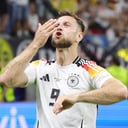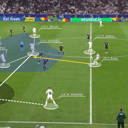Follow live coverage of England vs Slovakia and Spain vs Georgia at Euro 2024 today
Julian Nagelsmann’s Germany have landed some pretty good punches at this European Championship.
A dominant 5-1 win over Scotland on the tournament’s opening night. An impressive 2-0 follow-up against Hungary. And then a late, merited equaliser versus Switzerland to draw 1-1, remain unbeaten and finish top of Group A.
Advertisement
Given the bruising the combined German ego has sustained at the past few tournaments, the authority with which Nagelsmann’s team have played at Euro 2024 has been welcome. Public support is growing as we head into the knockout phase this weekend and the number of Germany replica shirts seen in stadiums, in the streets, and on buses and trains is growing every day.
Germany believes in Germany.
But how good is this team?
The headlines are positive.
Nobody at the tournament has scored more goals (eight, Austria are second with six) or had more shots on target (20, level with the Czech Republic). Jamal Musiala is playing some of the best football of his young career. Goalkeeper Manuel Neuer has recaptured his form at age 38. Toni Kroos is passing with precision and grace in a tournament he will retire at the end of.
For the past few years, Germany’s great weakness appeared whenever they lost the ball in an opponent’s half. Unsure of their ability to create chances and determined to manically press at every opportunity, they became perilously vulnerable to counter-attacks.
That flaw is still there, but it is diminishing.
Germany’s midfielders and attacking players have become much better at not letting their back line get exposed. Now, when possession turns over and their opponents are transitioning from defence into attack, there are many more players tracking runs and preventing danger from developing further.
That was particularly noticeable against Hungary last Wednesday. Between the first (22 minutes) and second goal (67 minutes), when Germany were controlling the ball in their attacking zones, the Hungarians were content to sit deep and periodically raid forward — and when they did, there was always just enough cover. That is a significant achievement. After all, how many of Germany’s worst moments since 2018 have come from impatience, imbalance or a fatal mixture of the two?
So there are defensive improvements, but Neuer has also been important. Nobody entered the tournament under more pressure, but while not flawless, he was largely excellent in those first three games.

His superb save from Granit Xhaka against Switzerland on Sunday allowed Niclas Fullkrug to claim the headlines with his late header just a few minutes later. Neuer has been such a source of security down the years for Germany (and Bayern Munich) that fans do not really know how to process his recent fragility. For now, it seems as if that conversation can be deferred.
Advertisement
That is a relief because some concerns imply Germany will need their goalkeeper to be at his best in the knockout rounds.
Jonathan Tah and Antonio Rudiger endured a difficult night against the Swiss.
Tah, in particular, suffered. He ordinarily plays in the middle of a back three for Bayer Leverkusen and the lack of cover made him vulnerable. He was yellow-carded late in the first half and withdrawn midway through the second. That booking means Tah is suspended and his Sunday replacement, Nico Schlotterbeck, will now start against Denmark in their round of 16 tie tomorrow (Saturday).
Nagelsmann has only been in the job since last September and his current starting line-up has only really been in place since the March friendlies — wins against France and the Netherlands. Schlotterbeck played well when he came on against Switzerland, but the forced change represents more disruption to a team that needs more familiarity.
At the other end of the pitch, Germany have outperformed their expected goals (xG) number by a bigger margin than any country at Euro 2024, scoring those eight goals from an xG of 5.10. So, while they may have scored high-quality goals, they have not necessarily created a lot of high-quality chances.
It was feared pre-tournament that the lack of width in Nagelsmann’s formation would place too much emphasis on Germany’s passing through the middle of the pitch. Those worries have not come to fruition, but they have hardly been vanquished.
Penetration in the final third has been consistent. Too often though, attacking moves have run out of space at the last moment, leaving Germany one pass away from a proper scoring chance or needing something exceptional — typically from Musiala — to manufacture an opportunity.

It’s a feature of the system.
Kai Havertz’s movement and capacity to hold the ball up are essential to the way Germany attack. The front five players also rotate positionally in a way that can make them hard to track. But, against Hungary and Switzerland, there were times when those attacking virtues did not create enough disruption for the defenders they were facing. Germany can still find themselves playing a lot of their football in front of the opposing defence while having too little effect on it.
Advertisement
The good news — and this has developed during the tournament — is that Nagelsmann’s squad is deeper than anticipated. He is getting good value from it.
His starting line-up has been the same in all three games and that would have continued against Denmark but for Tah’s suspension (although Rudiger also has a thigh injury and faces a late fitness test). However, his substitutes have been consistently influential. Fullkrug’s virtues are well established and, at his most fluent, Leroy Sane is an obvious danger. Emre Can and Pascal Gross have both been used to alter the balance or focus of the midfield or change its rhythm.

GO DEEPER
Uncomplicated, normal, a bull of a centre forward - Fullkrug is Germany's unlikely hero
In the sense that players seem willing to play certain roles and appear prepared to perform when they are needed, this group does seem harmonious. That in itself is a vindication for Nagelsmann.
The most controversial aspect of his squad selection was the decision to leave out Leon Goretzka and Mats Hummels. Both players are outspoken and high profile, yet neither was certain of a starting place and the risk of carrying two disaffected veterans was ultimately deemed not worthwhile.
That was a gamble. Had Germany stumbled through these opening three games, the criticism would surely have been fierce, as neither of those two players is short of allies in the German media. But Nagelsmann’s reward for making those decisions has been a set of players content in each other’s company and a squad that can be adapted around both the challenges it faces and its limitations — notably, that lack of width.
At times, Nagelsmann has shown his workings.
After the Switzerland draw, he was asked why he had chosen to bring on Hoffenheim forward Max Beier first at 1-0 down, on 65 minutes, rather than Fullkrug. He said he had spotted space around the sides of the Swiss back three and thought Beier’s speed and movement were the best ways of exploiting that.
Advertisement
Fullkrug was introduced 10 minutes later. That was the right time, he explained, because Switzerland had deepened their defensive line in response to Beier’s arrival. Nagelsmann had also spotted that David Raum, who had replaced Max Mittelstadt on the hour, was getting more chances to swing crosses in from the left and felt Fullkrug was the perfect target.

Everything makes perfect sense in hindsight, of course, and most managers sound tactically astute in press conferences. However, it was still testament to how much utility there is in this squad. Nagelsmann had spoken on the eve of the Swiss game about how much he trusted all his players and how each of them have a role to play in this tournament.
In the Raum cross and thumping Fullkrug header that rescued that match, and the group, he had a joined-up example of what he meant.

GO DEEPER
Germany are showing that Nagelsmann has quickly learned the art of international management
And perhaps that is where Germany’s strength lies.
Their starting line-up is talented but has deficiencies in areas which, perhaps, still make them outsiders to win this tournament. Denmark will be tough. Ask England. Spain, provided they take care of Sunday’s opponents Georgia, would be even tougher on Friday in the quarter-finals.
But they have enough flexibility to cope — and to throw a few more punches before this competition is over.
(Top photo: Kevin Voigt/GettyImages)

